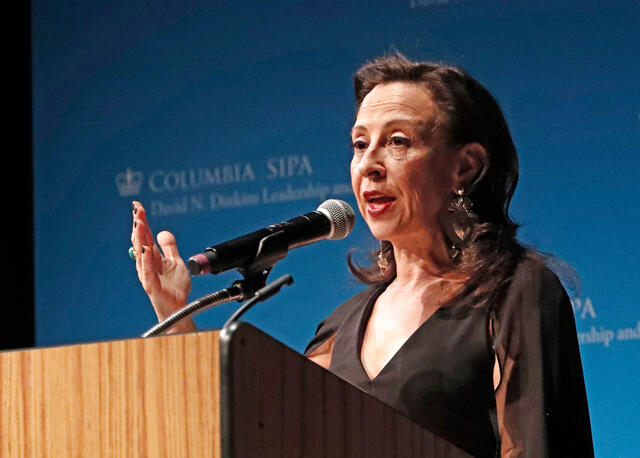
Maria Hinojosa Calls for Telling Human Stories of Immigration Crisis

Award-winning journalist Maria Hinojosa called for an emphasis on the human stories of the immigration crisis during her keynote speech at the 22nd annual David N. Dinkins Leadership and Public Policy Forum.
One of SIPA’s signature events, the forum convenes distinguished guests, scholars, and practitioners each year for an examination of policies and programs that affect urban America.
This year’s edition, held on April 10, focused on the crisis of U.S. immigration policy with special attention to how children are being negatively impacted. In introductory remarks, Dean Merit E. Janow described the current state of affairs as “disturbing, cruel, and fundamentally not in sync with our nation.”
David N. Dinkins, the longtime SIPA professor and 106th mayor of New York City who oversees the event, introduced Hinojosa, who is a news anchor and producer of the NPR program Latino USA.
An American citizen who immigrated from Mexico, Hinojosa began by telling her own story—specifically, the experience of arriving in the United States at the age six with her mother and siblings in 1962.
Hinojosa’s father, a doctor, had taken a position at the University of Chicago and had traveled two weeks earlier. At a layover in Dallas, the rest of the family was stopped. While their paperwork was all in order, an American agent told Hinojosa’s mother, “We’re going to have to keep the little one here. She’s got a little bit of a rash.”
Hinojosa was the little one.
Her mother reacted with a voice that Hinojosa said she still remembers today. She started counting off all the reasons they should all be let through—about the paperwork being in order, her husband being a doctor who was invited here by a university, each thought punctuated with a politely forceful “Sir.” The agent relented and the entire family made its way to Chicago.
In the summer of 2018, Hinojosa got a call from her mother, who was in tears. She had been watching news coverage about families that had been separated at the Mexican border.
“They tried to do it to you,” Hinojosa’s mother said, distress in her voice. “This was you. They tried to take you away from me.”
“This is not new,” Hinojosa said, citing SIPA’s Ester R. Fuchs, who has observed that the experience of the newest generation of immigrants echoes the earlier experience of families at Ellis Island, Native Americans, African Americans, and Japanese Americans, among others.
“It’s not new,” Hinojosa repeated, “but it has absolutely gotten worse.”
She suggested that journalists have a hard time telling these stories because children and families are held at private facilities that are filled with government officials, who will do almost anything to avoid the press.
Still, Hinojosa said, families are being separated everywhere, not just at the border. Nine blocks away from Miller Theatre, she said, is a shelter that holds immigrant children. In airports across the country groups of children are being shuttled around from city to city, with their parents having no way to keep track of them.
“Open your eyes and begin to ask questions,” she told the audience.
Hinojosa recalled her own experience as a young reporter, when she interviewed Elie Wiesel, the famed writer who had survived the Holocaust, and asked him what he thought about illegal immigrants.
“There is no such thing as an illegal human being,” Wiesel had told her. “The first thing the Nazis did was to declare the Jews as illegal.”
Hinojosa said the current moment reflects the consequences of “dehumanizing” and “otherizing”—what the current administration thinks it can get away with.
“Over and over and over in the mainstream news immigrants are referred to as ‘illegals,’” Hinojosa said. “What does it matter if they aren’t fed or assaulted?”
She said that some observers tell her to “calm down,” that certain reporters are “too close to the story.”
“I’m not going to calm down,” Hinojosa said. “Not because I’m a Mexican immigrant, but because I’m an American citizen. That’s why I’m not going to calm down.”
Indeed, while some might feel hopeless, Hinojosa said she sees it as a challenge, and looks to the likes of Frederick Douglass and Harriet Tubman for inspiration. If they can achieve what they did in their circumstances, she said, “certainly, I can do this work of revealing these stories to you.”
After Hinojosa concluded her speech, an expert panel further considered the public-policy implications of practices at the border and how to protect children.
Participants in the panel discussion included Steven Choi, executive director of the New York Immigration Coalition, the nation’s largest immigrants’ rights organization; Lee Gelernt, deputy director of the ACLU; Michael A. Nutter, the David N. Dinkins Professor of Professional Practice in Urban and Public Affairs at SIPA and 98th mayor of Philadelphia; and Dr. Irwin Redlener, co-founder of the Children’s Health Fund and director of the National Center for Disaster Preparedness at the Mailman School of Public Health. The panel was moderated by Fuchs, a professor of international and public affairs and political science who directs SIPA’s Urban and Social Policy program.
— Claire Teitelman MIA ’19
photo by Lou Rocco